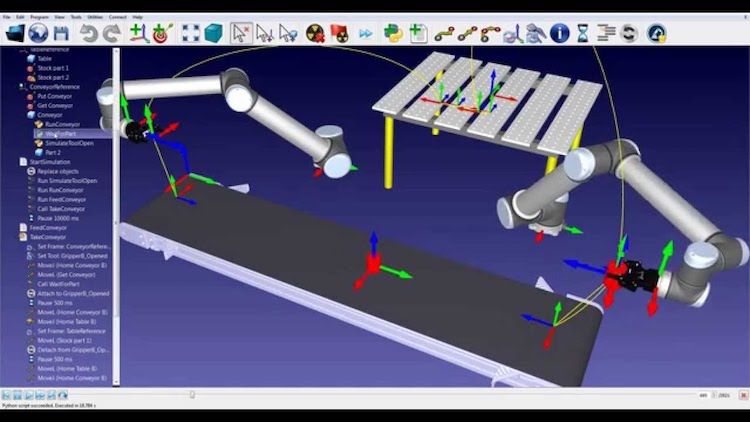RoboDK celebrates five years of robot virtualisation software
Founded by Albert Nubiola and Lauren Ierullo in January 2015, RoboDK is a spin-off company from the CoRo laboratory at ETS University in Montreal, Canada, one of the most prestigious robotics labs in North America.
While working on his PhD at CoRo lab, RoboDK’s CEO Albert Nubiola was the main developer of RoKiSim, a multi-platform educational software tool for 3D simulation of serial six-axis robots.
RoboDK software is the extended commercial version of RoKiSim and is designed to bring powerful robotics simulation and programming capabilities to companies large and small and to coders and non-coders alike.
“In 2015, traditional simulation software cost almost as much as an industrial robot. RoboDK was founded to bring affordable, state of the art simulation and robot programming software to all,” says Nubiola.
The market for industrial robots has changed dramatically in the relatively short time since then.

The constantly evolving world of industrial robots
The industrial robotics landscape is fast-moving, with new robots and new original equipment manufacturers (OEMs) emerging each year.
Keeping pace with the constantly evolving world of industrial robots and OEMs is one of RoboDK’s main missions, says co-founder and Director of Marketing, Lauren Ierullo.
“RoboDK is designed to enable companies to simulate and program any robot with one piece of software at an affordable price. Keeping that promise to our customers means that we regularly update our software library to incorporate the latest industrial robot technologies” says Ierullo.
At launch, RoboDK’s software library supported 200 robots from more than 20 robot manufacturers. Today, it supports more than 500 robots from 50 manufacturers, including ABB, Fanuc, Kuka, Yaskawa, Stäubli and Universal Robots.
RoboDK found its first customer in 2015; a New Zealand-based manufacturer that used RoboDK to calibrate an ABB robot for robot milling. Today, the firm has more than 30,000 active users spread across 15 countries.
Keeping its software library up-to-date with the latest industrial robots is just one part of the company’s offering, says Nubiola.
RoboDK software now comes with 15 different types of robot application examples, from robot milling to pick & place and polishing. It also offers plugins for CAD/CAM software. Users can easily program industrial robots with CAD to robot simulations, directly from SolidWorks, Mastercam, Autodesk Inventor, Fusion 360 or Rhino.
RoboDK’s ability to support a wide range of industrial robots is made possible by an extensive network of more than 50 partnerships with leading robot and OEM makers such as API, Creaform and IDEC.
“As industrial robotics evolves, so does RoboDK,” says Nubiola. “We want to empower our customers with the latest post processors, calibration tools and essential plugins and all at a cost that’s several times lower than that of our competitors.”
Meanwhile, the RoboDK API is a universal robot programming language that enables software developers and integrators to create advanced, non-brand specific robot programs and deploy their solutions on any robot controller.
Customer success stories include NASA
In 2017, a team at NASA’s Langley Research Center, in Virginia, USA, was tasked with developing an automated inspection system for composite aircraft fuselages.
The researchers settled on a cobot-based solution using a UR10 from Universal Robots and RoboDK software for offline programming and simulation, including the use of simulated inspection patterns to maximize path efficiency.
In 2019, building on the success of the original project, NASA unveiled a multi-robot system that uses two synchronized cobots to perform line scan tomography inspections on aircraft fuselages.
Designed to facilitate multi-software workflows, RoboDK software enabled the researchers to synchronize 2 robots and incorporate external axes into their simulations.
Spotify and sculptures
When Neoset Designs, a New York-based art and digital fabrication studio, was asked to collaborate with music streaming service Spotify on the “RapCaviar Pantheon” robot sculpting project, they turned to RoboDK.
Using RoboDK’s robotic milling features, the team managed to complete three large sculptures of outstanding rap artists in just 15 days.
Art and the Carters
Artists Rob and Nick Carter chose RoboDK for their pioneering ‘Dark Factory Portraits’ project, in which an industrial robot arm, working “blind” (that is, without vision sensors), produces fine art portraits of famous artists.
An exhibition of the Carters’ work will be held in the prestigious Ben Brown Fine Arts gallery, London, from Feb 12 to April 17, 2020.
RoboDK timeline
- 2015: RoboDK launches, finds first customer; a New Zealand-based manufacturer that used RoboDK to calibrate an ABB robot for robot milling
- 2016: RoboDK works closely with partners and customers to enhance its offering
- 2017: RoboDK 3.0 is launched, bringing several new features and applications; NASA
- uses RoboDK to build an automated fuselage inspection system
- 2018: RoboDK adds 4 plugins and automated robot drilling functionality
- 2019: RoboDK adds automatic collision avoidance, virtual reality capabilities and an Integrated VSCode extension for improved code visualization; NASA dual-robot inspection project unveiled at Langley
- 2020: RoboDK is available on Android, iOS and Raspberry; becoming the only robot simulation and programming software to support full simulation capabilities on mobile platforms
The future of RoboDK and robot simulation
Customer success stories like these, repeated many times around the world. And as the industrial robotics market grows, RoboDK expects to grow with it.
“To ensure the satisfaction of new and existing users, we plan to continue offering new applications and plugins and further extending RoboDK’s robot library,” says Ierullo.
The firm also plans to increase its international reach over the next few years, says CEO, Nubiola. “With the help of our distributor network, we plan to offer RoboDK software on all six continents,” he says.
“And, above all, RoboDK wants to continue inspiring and helping people around the world with their robotics projects so that they have more success stories to share.”

